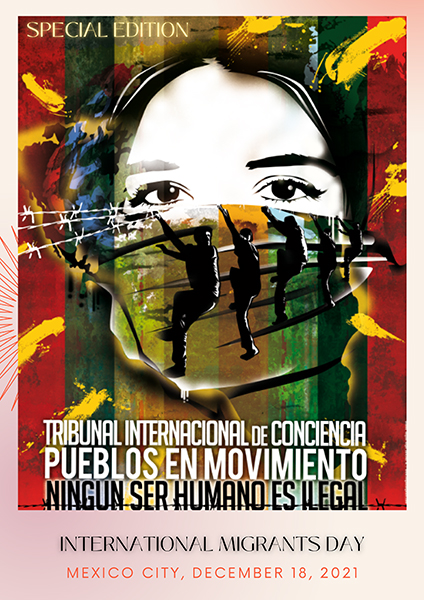Editor’s note: This statement was issued on behalf of the International Tribunal of Conscience of Peoples in Movement. It deals in part with the tragedy that occurred in Chiapas, Mexico, Dec. 9, when a truck carrying an estimated 166 migrants flipped over, resulting in at least 57 deaths and more than 100 people injured. It also refers to an upcoming virtual forum planned for January 2022. For more information about the Tribunal, contact: tribunal.ticpm@gmail.com.

Today [Dec. 18, 2021] we commemorate International Migrants Day and dedicate it to the lives and hopes of each one of the victims of the recent migrant tragedy in Chiapas. These include our sisters and brothers who are primarily of indigenous origin from Guatemala, as well as others from Ecuador, Honduras, the Dominican Republic, and Mexico. We join our hands and spirits here with the suffering of each one of the families and communities afflicted by this horror, and stand in solidarity with their cries for truth, justice, and for the full reparation of their losses.
This cry echoes that of the tens of thousands of migrant victims of crimes and atrocities on Mexican territory since the massacre and mass graves of San Fernando, and equivalent outrages such as those of Cadereyta, Güemes, and Camargo, as well as the recurrent mass forced disappearances and kidnappings that configure the landscapes of this collective slaughter.
At the same time, it must be urgently acknowledged that this incident in Chiapas reflects a much more generalized pattern of vulnerability and persecution of migrants in transit through Mexican territory. This is the predictable result of the complicity of U.S and Mexican officials who have joined together to implement the containment and repression of these migrant flows. All of this necessarily includes the militarization of borders, border regions, and migrant routes, and the criminalization of migrants.
It also includes the negation, in practice, on both sides of the border, of the right to seek asylum, through U.S policy measures such as Title 42—which authorizes the mass expulsion of migrants without due process—by weaponizing the COVID 19 pandemic as a pretext. This has resulted since September 2021 in the mass expulsion of more than 13,000 Haitians. It is Haiti which was the first nation in the world to abolish slavery. But it was also Haitians whose migrants were corralled and whipped publicly by the reins of U.S Border Patrol agents on horseback, as if they were seeking to return them to a status of enslavement.
The second crucial weapon in this arsenal of exclusion is the binational reactivation of the “Remain in Mexico” policy which transforms Mexico in effect into a “safe third country.” These kinds of systematic abuses have also included the forced separation of families, the indefinite detention of migrant youth in inhumane conditions, and the deaths in custody of migrants—including indigenous migrant children and youth—at the hands of the U.S Border Patrol, as well as the violent repression and harassment of migrant caravans both in Mexico and Guatemala.
Meanwhile, Mexican authorities have intensified their own measures which have the effect of denying the right to seek asylum, as well as the mass expulsion by land and air of migrants as a complementary mechanism at its southern border. All of this reproduces the prevailing repressive paradigm of migration policy on a global scale which characterizes equivalent contexts such as the Euro-Mediterranean region and the environs of Australia in East Asia, producing the same kinds of widespread crimes against humanity that we have witnessed and documented since 2010. Their ripple effects have resonated throughout Latin America and the Caribbean region.
The joint response of Mexican, U.S, Guatemalan and UN officials to the human catastrophe in Chiapas has been, as previously, for the intensification of drastic immigration control measures in the name of combatting human smugglers and traffickers. But we know from past experience that this will simply deepen the criminalization of migrants, which is what nourishes their precarity, and which generates incentives for the extortions and profits of the traffickers who benefit from each obstacle which impedes legal channels of migration.
It is the migration policies of the U.S and Mexico which expose migrants to these and other forms of exploitation, and to the kinds of abuses which are inflicted most intensely on migrants who are indigenous or of African descent, and on women and girls. And it is their countries of origin who share responsibility for their suffering by expelling them from their homelands. It is because of the need to address crimes such as these that the International Tribunal of Conscience of Peoples in Movement (ITCPM) was founded in November 2010 in Mexico City, as the first citizen’s tribunal of its kind in the world. Our commitment since then has been to project an integral vision focused on the defense of the collective, transnational rights of the protagonists of every dimension of human mobility, including migrants, refugees, asylum seekers and internally displaced persons, and on the promotion of international recognition of the right to universal freedom of movement. This led to our contribution to relevant components of the overall process of the Mexican chapter of the Permanent Peoples’ Tribunal (PPT) in Mexico between 2011 and 2014.
This path has included the great honor we had of the accompaniment, from the beginning, of Father Pedro Pantoja, former political prisoners such as General Francisco Gallardo, Dr. Jorge Bustamante, Dr. Rodolfo Stavenhagen, and transnational indigenous scholar-activists such as Rufino Domínguez Santos, and Pedro González Gómez, who have sadly departed. But their legacies remain through the inspiration of their examples, teachings, and commitment, which we will always seek to honor and emulate. Today we also commemorate them. Now more than ever we are confronted by a regional and global migration emergency which calls for the convergence of all of the initiatives, groups, and organizations that can be mobilized in solidarity with peoples in movement everywhere, and with their demands.
Our call today then is to all who are motivated by solidarity—organizations, advocates, scholars, and people of faith, to join together with us in this struggle. A first step is a virtual forum that we will convene towards the end of January 2022, as a space where we can dialogue and learn from each other, propose and support needed actions, and imagine and undertake new initiatives together.
No human being is illegal! All rights for all: Without borders!

